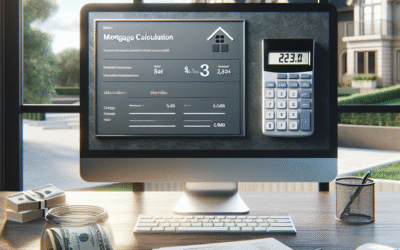Understanding the 10 Home Loan Deposit Requirement
What is a Home Loan Deposit?
A home loan deposit is the amount of money a buyer puts down upfront when purchasing a property. This deposit is typically expressed as a percentage of the home’s purchase price. For example, if you are buying a home worth $300,000, a 10 home loan deposit would amount to $30,000. The deposit reduces the loan amount needed and signifies to the lender that the buyer has a financial stake in the property.
Importance of a 10% Deposit
A 10% deposit is significant for several reasons. First, it demonstrates financial responsibility and commitment from the buyer. Lenders view a 10 home loan deposit favorably, which can lead to better loan conditions, such as lower interest rates. Additionally, a 10% deposit can help buyers avoid lenders mortgage insurance (LMI), which is often required for deposits under 20%. By providing a larger deposit, buyers may save money in the long run.
Benefits of a 10 Home Loan Deposit
Lower Monthly Payments
One of the primary benefits of a 10 home loan deposit is the potential for lower monthly payments. A larger upfront payment reduces the total loan amount, which means borrowers pay interest on a smaller principal. For instance, if you take out a loan for $270,000 instead of $300,000 due to a $30,000 deposit, your monthly payments will be significantly lower. This can ease financial stress and allow for easier budgeting.
Increased Loan Approval Chances
Having a 10 home loan deposit can also increase your chances of loan approval. Lenders are more likely to approve a loan for someone who has a substantial deposit. It shows that you can save and manage your finances, which is a positive indicator of your ability to repay the loan. This can be especially beneficial in competitive housing markets, where lenders may have many applications to consider.
How to Save for a 10 Home Loan Deposit
Budgeting Tips
Saving for a 10 home loan deposit requires careful planning. Here are some effective budgeting tips to help you reach your savings goal:
- Create a Savings Plan: Determine how much you need to save each month to reach your deposit goal by your target purchase date.
- Track Your Expenses: Monitor your spending to identify areas where you can cut back. Consider apps or spreadsheets for easy tracking.
- Set Up a Separate Savings Account: Open a dedicated savings account for your deposit. This can help you avoid spending the money you’ve set aside.
- Automate Your Savings: Set up automatic transfers to your savings account each payday to make saving easier.
High-Interest Savings Accounts
Consider placing your savings in a high-interest savings account. These accounts offer better interest rates than regular savings accounts, helping your money grow faster. Some banks even offer special accounts designed for home buyers, which can be an excellent way to maximize your savings while you prepare for that 10 home loan deposit.
Alternatives to a 10 Home Loan Deposit
Low Deposit Home Loans
If saving for a 10 home loan deposit seems daunting, there are alternatives available. Low deposit home loans allow buyers to secure a mortgage with a smaller deposit, often as low as 5% or 3%. However, these loans typically require LMI, which can increase your overall costs. It’s essential to weigh the long-term implications of these loans against your financial situation.
Government Assistance Programs
Many governments offer assistance programs to help first-time homebuyers. These programs may provide grants or loans to cover part of the deposit or help with closing costs. Research local and national programs to see if you qualify for any assistance that could help you achieve your home ownership dreams with a lower deposit.
Common Myths About the 10 Home Loan Deposit
Myth 1: You Need 20% Deposit
A common misconception is that you must have a 20% deposit to secure a home loan. While a 20 home loan deposit can provide better loan terms and help you avoid LMI, many lenders accept lower deposits. A 10 home loan deposit is often sufficient, especially for first-time buyers.
Myth 2: A 10% Deposit Means Higher Interest Rates
Another myth is that having a 10% deposit will automatically lead to higher interest rates. While lenders may view lower deposits as higher risk, a strong credit score and stable income can counterbalance the deposit size. Always shop around and compare offers from different lenders to find the best rates available to you.
Conclusion: Is the 10 Home Loan Deposit Right for You?
Factors to Consider
Deciding whether a 10 home loan deposit is right for you involves evaluating your financial situation. Consider your savings, income stability, and future financial goals. If you can comfortably save 10%, it may be a good option. However, if you foresee challenges in maintaining that deposit, exploring other loan types might be more beneficial.
Final Thoughts on Home Buying
Buying a home is a significant milestone, and understanding the implications of a 10 home loan deposit is crucial. With the right knowledge and planning, you can navigate the home buying process confidently. Remember, whether you opt for a 10% deposit or explore alternative options, make informed decisions that align with your financial future.
FAQs
- What is a 10 home loan deposit?
A 10 home loan deposit is the upfront payment of 10% of the home’s purchase price required when obtaining a mortgage.
- Can I get a home loan with less than a 10% deposit?
Yes, many lenders offer low deposit home loans that allow you to purchase a home with deposits as low as 3% or 5%.
- Do I need to pay lenders mortgage insurance with a 10 home loan deposit?
Generally, if your deposit is 10%, you may still need to pay LMI. It’s best to check with your lender for specific requirements.
- What are the benefits of a 10 home loan deposit?
Benefits include lower monthly payments, increased chances of loan approval, and potential savings on interest.
- How can I save for a 10 home loan deposit?
You can save by creating a budget, cutting unnecessary expenses, and using high-interest savings accounts.
- Are there assistance programs for first-time homebuyers?
Yes, many governments offer programs to help first-time buyers with down payments and closing costs. Research options available in your area.





0 Comments